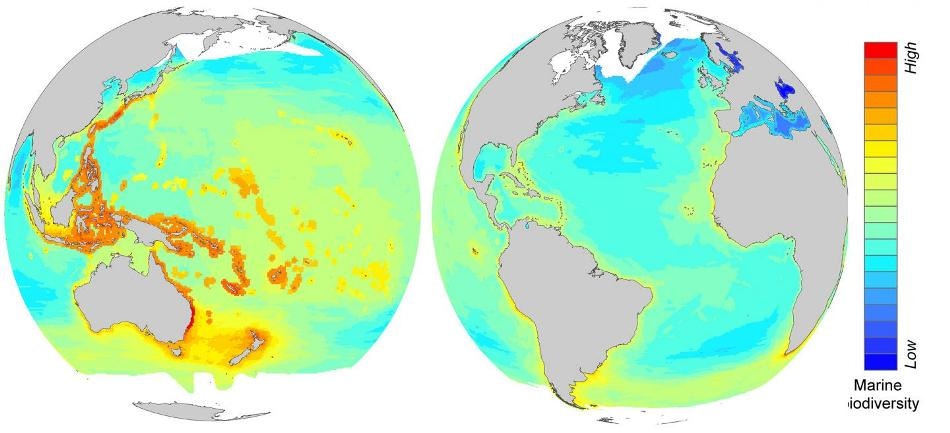Feb 23 2017
 Global distribution of marine biodiversity is shown. Colors denote the number of species, with red colors indicating areas with the highest biodiversity. CREDIT: F. Ram�rez, I. Af�n, L. S. Davis, and A. Chiaradia.
Global distribution of marine biodiversity is shown. Colors denote the number of species, with red colors indicating areas with the highest biodiversity. CREDIT: F. Ram�rez, I. Af�n, L. S. Davis, and A. Chiaradia.
An innovative study with the main focus of identifying oceanic areas that come under highest conservation priority in the world has discovered six “hot spots of marine biodiversity” critically affected due to fishing pressures as well as climate change.
Although it is a known fact that human activities cause environmental changes that might ultimately lead to the ecosystem collapsing, earlier studies have not analyzed the overlap between the distribution of global species in the oceans and the marine areas that are at a major risk of climate change.
Francisco Ramírez and his collaborators put together a database of 2183 marine species and more than three decades worth of information related to ocean currents, sea surface temperatures, and marine productivity. The researchers also assessed the industrial fishing data for the past six decades.
There was an uneven distribution of changes to the oceans on Earth revealed by the environmental data, where the most prominent shifts were observed for the tropics and poles. Six areas of high biodiversity were identified by the researchers, which were marine areas in tropical and temperate regions in the Atlantic, Indian and Pacific Oceans.
Apart from the impact on nutrient availability, ocean temperatures, and currents in such species-rich areas due to environmental changes, the global fish stocks have also been considerably reduced due to industrial fishing. The investigation of fisheries data indicated that harvest pressure is sure to sustain and further intensify pressure on fish populations in such areas.
The researchers further added that the impact due to industrial fishing and climate changes has to be simultaneously taken into account for making conservative efforts. They also urge the international community to take steps in conserving biodiversity through the fishing policies, akin to the manner in which climate change is dealt with on a global scale.
Source: http://www.aaas.org/